|
|
|
Sort Order |
|
|
|
Items / Page
|
|
|
|
|
|
|
| Srl | Item |
| 1 |
ID:
145470
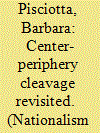

|
|
|
|
|
| Summary/Abstract |
The article examines the evolution of Eastern and Central European party systems from the previous communist/anticommunist conflict to the emergent division between pro-EU and Eurosceptic forces and puts forward a revised view of the traditional center-periphery cleavage in six countries: Poland, Hungary, the Czech Republic, Slovakia, Bulgaria, and Romania. The first part addresses the question of “stateness” and the second the Rokkan spatial approach while the third develops a revised view of the center-periphery cleavage in relation to space at the national (minority ethnic groups vs. state), regional (EU vs. Eastern European member states), and global (USSR vs. satellite countries during the bipolar system) levels.
|
|
|
|
|
|
|
|
|
|
|
|
|
|
|
|
| 2 |
ID:
051270
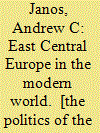

|
|
|
|
|
| Publication |
California, Stanford University Press, 2000.
|
| Description |
xvi, 488p.: ill., maps, table, figuresPbk
|
| Contents |
Includes all bibliographies references and index.
|
| Standard Number |
0804746885
|
|
|
|
|
|
|
|
|
|
|
|
Copies: C:1/I:0,R:0,Q:0
Circulation
| Accession# | Call# | Current Location | Status | Policy | Location |
| 048114 | 947.000904/JAN 048114 | Main | On Shelf | General | |
|
|
|
|
| 3 |
ID:
073656
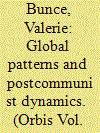

|
|
|
|
|
| Publication |
2006.
|
| Summary/Abstract |
Many of the new democracies that have been formed since the fall of the Soviet Union in 1991 lack what had long been understood as preconditions for the democratic project: an earlier history of democratic politics, high personal incomes, a large middle class, and/or settled borders. The most distinctive aspects of this wave of democratic transitions are rapid regime change and the rise of democracies that exhibit a mixture of both authoritarian and democratic elements. This article explores what these new democracies can teach us about the factors that seem to encourage a transition from dictatorship to democracy, and what factors seem to contribute to its sustainability and institutionalization.
|
|
|
|
|
|
|
|
|
|
|
|
|
|
|
|
| 4 |
ID:
055259
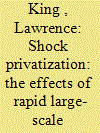

|
|
|
| 5 |
ID:
080008
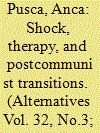

|
|
|
|
|
| Publication |
2007.
|
| Summary/Abstract |
This article explores how the concept of shock has been used in connection to processes of social change and transition, and argues that a wider exploration of the concept in fields other than political science and international relations can provide us with important insights into the individual and collective impacts of transitions. Although criticizing the idea of shock as therapy, the article presents a number of alternative uses of shock that can be particularly insightful for understanding often contradictory behaviors that characterize periods of transition, as well as a series of dangerous consequences of attempts to deal with shock through various techniques of distancing, distraction, and normalization
|
|
|
|
|
|
|
|
|
|
|
|
|
|
|
|
| 6 |
ID:
119051
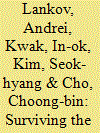

|
|
|
|
|
| Publication |
2013.
|
| Summary/Abstract |
The article deals with the everyday survival strategies employed by the workers of (largely non-functioning) state enterprises in post-socialist North Korea, and with the social changes this group has dealt with in the last two decades. It also compares these trends with the experiences of post-socialist Eastern Europe. In the 1990s the economic role of the North Korean state decreased dramatically. Official wages could no longer guarantee the physical survival of the populace, so workers from state industries engaged in a multitude of economic activities which were (and still are) largely related to the booming "second economy." These activities include private farming, employment in semi-legal and illegal private workshops, trade and smuggling, as well as small-scale business activities. The choice of a particular activity depends on a number of factors, of which network capital is especially significant. Income is also augmented by the illegal use of state resources and widespread theft of material and spare parts from state-owned factories. As a result of these changes, the industrial working class of North Korea, once a remarkably homogenous group, has fragmented, and its members have embarked on vastly different social trajectories.
|
|
|
|
|
|
|
|
|
|
|
|
|
|
|
|
| 7 |
ID:
105894
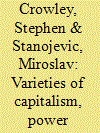

|
|
|
|
|
| Publication |
2011.
|
| Summary/Abstract |
Although Slovenia is a small, relatively new nation-state, it has been justifiably called "neocorporatist" and a "coordinated market economy," making it unique among postcommunist societies, including ten new EU member states. The authors explore how it became so, and in the process shed light on the debate between varieties of capitalism (VoC) and power resources theories about how coordinated or neocorporatist economies emerge. Although several of the elements predicted by the varieties of capitalism perspective were present in Slovenia, others were not. The authors also find that a significant mobilization by organized labor at a crucial point played an essential role, and overall find that power resources theory has greater explanatory power in this case. However, in turning from explaining how the Slovenian model was formed to why it was so unique among postcommunist cases, they find that specific historical legacies were critical, particularly those from the distinct Yugoslav form of communism.
|
|
|
|
|
|
|
|
|
|
|
|
|
|
|
|
|
|
|
|
|